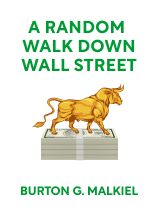

This article is an excerpt from the Shortform book guide to "A Random Walk Down Wall Street" by Burton G. Malkiel. Shortform has the world's best summaries and analyses of books you should be reading.
Like this article? Sign up for a free trial here .
What are ETFs in stocks? Are exchange-traded funds worth investing in?
ETFs in stocks are similar to mutual funds but are instead traded on the market like common stock. These types of funds are beneficial as they can sometimes offer tax advantages. Understanding the pros and cons of ETFs in stocks will help you decide whether they are right for you.
So, what are ETFs in stocks? Keep reading to find out.
What Are ETFs In Stocks?
Although traditional index mutual funds are by and large tax friendly, they can occasionally incur capital-gains-tax exposure (usually due to buyouts of companies in the index or the sale of shares to redeem fundholders).
ETFs—funds traded on the market like common stock—can sometimes offer greater tax advantages than traditional index mutual funds. This is because they can redeem shareholders via “in kind” redemptions—transfers of the fund’s underlying assets rather than cash. In-kind redemptions don’t trigger capital gains taxes (because the gain isn’t realized as cash but rather as the underlying assets). ETFs also feature extremely low expenses.
That said, holding ETFs isn’t completely free. There are transaction costs associated with them, and there’s also the temptation to try to trade your shares on a daily basis to realize a quick gain. Don’t. The taxable gains you stand to realize on an ETF trade pale in comparison to the benefits of holding the ETF for the long haul.
So, what are ETFs in stocks? Here are some examples:
| Some ETFs | ||
| Type | Name | Expense Ratio |
| Total US Stock Market | Vanguard Total Stock Market (VTI) | 0.04% |
| SPDR Total Stock Market (SPTM) | 0.03% | |
| Developed Markets (Europe, Australasia, and the Middle East) | Vanguard Europe Pacific (VEA) | 0.07% |
| iShares Core MSCI Intl. Developed Markets (IDEV) | 0.07% | |
| Emerging Markets | Vanguard Emerging Markets (VWO) | 0.14% |
| SPDR Emerging Markets (SPEM) | 0.11% | |
| Total World (excl. US) | Vanguard FTSE All World (VEU) | 0.11% |
| iShares Core MSCI Total International Stock (IXUS) | 0.11% | |
| Total World (incl. US) | Vanguard Total World (VT) | 0.10% |
| iShares MSCI ACWI (ACWI) | 0.32% | |
| Bond Market US | Vanguard Total Corporate Bond Fund (VTC) | 0.07% |
| Schwab US Aggregate Bond (SCHZ) | 0.04% |

———End of Preview———
Like what you just read? Read the rest of the world's best book summary and analysis of Burton G. Malkiel's "A Random Walk Down Wall Street" at Shortform .
Here's what you'll find in our full A Random Walk Down Wall Street summary :
- A comprehensive and entertaining introduction to the world of finance
- Practical investment principles that work for every skill level
- The advantages of index investing






